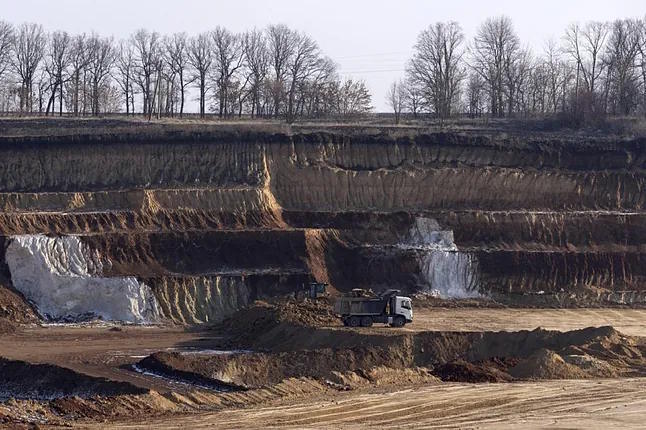The latest version of the agreement already closed on the so-called rare earths hides many more keys for the hypothetical peace in Ukraine than those that appeared in the initial draft. In this text, presented on February 14 to Volodymyr Zelenski by the US Treasury Secretary, Scott Bessent, there was no mention of Ukraine's most important request, the security guarantees that Kiev demands against Russia. Additionally, it stipulated that the US would keep 50% of the income generated by mining operations in Ukraine without any counterpart. "I will not sign something that 10 generations of Ukrainians will have to pay for," said the Ukrainian president in response to threats from Trump: "I will revive this agreement, and the outcome will not be very happy for Zelenski." Meanwhile, in the background, the negotiating teams were working on a text that sounds much more reasonable for both Washington and Kiev and contains many more nuances than previously published:
Although in theory it may seem like a mercantilist imposition by the Trump Administration on Ukraine, the initial idea actually originated from Zelenski himself during his visit to Trump Tower last September. In that conversation, the Ukrainian president, who already foresaw the economic interest of any relationship with the magnate, subtly introduced this proposal as part of his Victory Plan, which included the shared exploitation of rare earths and strategic minerals. During that meeting, Zelenski exaggerated Ukraine's underground wealth, but managed to plant the idea in Trump's mind as a possible exchange. For the magnate, it was like hearing sirens' songs.
The agreement to be signed by Trump and Zelenski, in which the US makes it clear that "the American people wish to invest together with Ukraine in a free, sovereign, and secure Ukraine," is not intended as a means to repay Washington for its military contribution so far (as it does not mention any debt), but goes further: "This agreement aims to establish an Investment Fund for Reconstruction" in which both parties "will participate through joint ownership."
As stated in article 4 of the text: "The US Government will maintain a long-term financial commitment to the development of a stable and economically prosperous Ukraine." Trump delivered one of his typical speeches about the agreement in the Oval Office yesterday, talking a lot but explaining very little: "A lot of equipment and military material and the right to keep fighting," he said, without anyone knowing if he was referring to the past or the future, and added that Ukrainians "are very brave and good soldiers." This is a far cry from his rhetoric just a few days ago. Zelenski stated: "It is just a beginning, a framework, but it can be a great success."
The text mentions that one of the objectives is to "provide Ukraine with security guarantees," although it does not specify them. This is one of the issues that Zelenski must define with Trump himself, although as several analysts have already pointed out, the fact that the US will jointly exploit these resources already represents some form of guarantee, as if Russia were to attack Ukraine again, as it has done, it would also seriously clash with US economic interests.
The Ukrainian president recently heard from Trump himself that he was "a dictator without elections." The fact that Trump is now receiving him at the White House to sign an agreement in which they both refer to each other as "business partners" rehabilitates him in the eyes of the Trump Administration. In other words, Zelenski will sign the peace agreement, something that Moscow is already anticipating.
Just yesterday, Putin gave an interview in which he stated that "elections in Ukraine are not held under martial law," the first real acknowledgment by Putin that Ukrainian law prohibits (democratically) holding elections during martial law. US President Donald Trump has already stated that Putin and Zelenski must engage in negotiations, and it is likely that the Kremlin autocrat is changing his rhetoric to explain to the Russian public his decision to engage in future negotiations with Zelenski.
Ukraine holds around 5% of the world's mineral resources, but the total inventory dates back to the Soviet era and has not been updated. The vast majority of minerals and rare earths that interest the US and Trump have not been exploited, are difficult to access, or are located in territory occupied by Russia. Among the minerals already being exploited by Ukraine are three critical ones: manganese (the eighth largest producer globally according to World Mining Data), titanium (11th largest producer), and graphite (14th largest producer), essential for electric batteries and nuclear reactors.
According to other mining publications, Ukraine is "one of the leading countries in Europe in lithium exploitation, essential for the production of electric car batteries." In the Donbas region controlled by Ukraine, one of Europe's largest lithium reserves is located, although the government states that it is not currently being extracted due to the proximity to the front line, about 10 kilometers away. Beneath the surface lie abundant reserves of lithium, tantalum, niobium, and beryllium.
To develop all the untapped deposits, Ukraine would need to invest money it does not have, so its partnership with the US could provide the commercial partner needed to extract these minerals and potentially earn at least a 50% profit from them. For example, the Novopoltavske deposit in the Zaporizhia region alone would require an investment of around $300 million, according to Ukrainian government sources.
With the impending agreement, the photo of Zelenski with Trump in the Oval Office on Friday puts him back on the chessboard from which Putin wanted to remove him. Now he is no longer a "dictator," but a business partner. The success will depend on the security guarantees that the US offers.
